外研版必修五 Module 1 British and American English Listening & Everyday English 课件(26张PPT)
文档属性
| 名称 | 外研版必修五 Module 1 British and American English Listening & Everyday English 课件(26张PPT) |
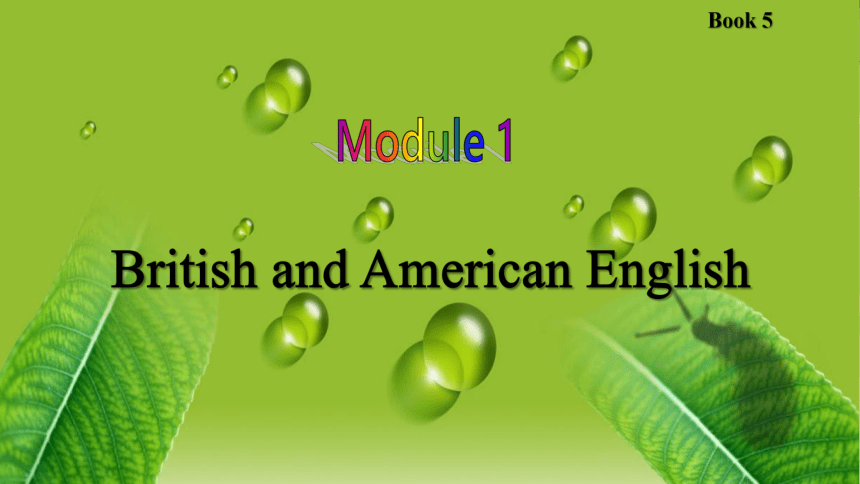
|
|
| 格式 | pptx | ||
| 文件大小 | 3.5MB | ||
| 资源类型 | 教案 | ||
| 版本资源 | 外研版 | ||
| 科目 | 英语 | ||
| 更新时间 | 2022-10-26 21:40:29 | ||
图片预览


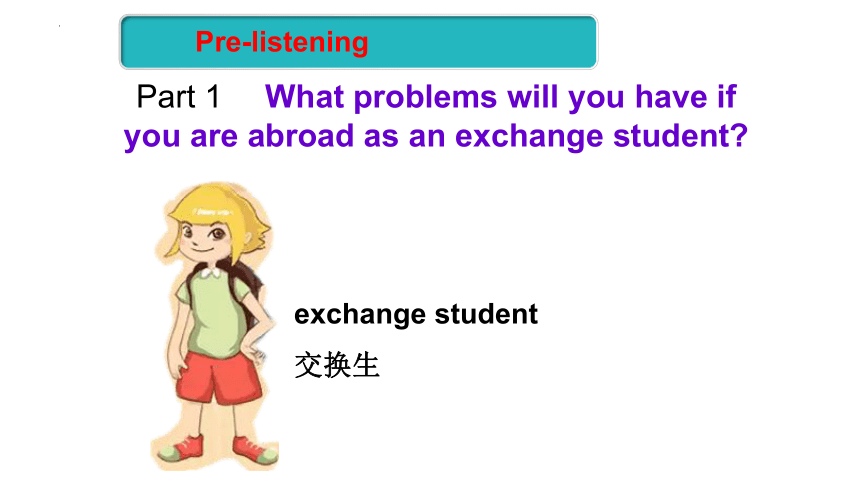
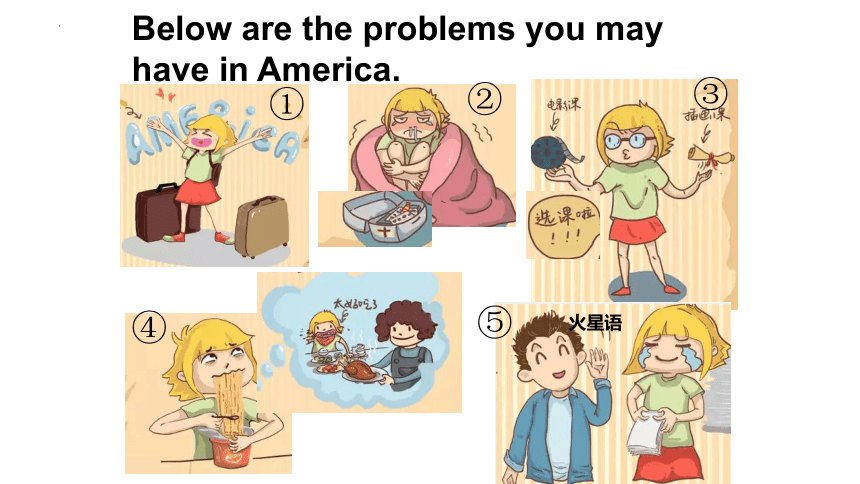


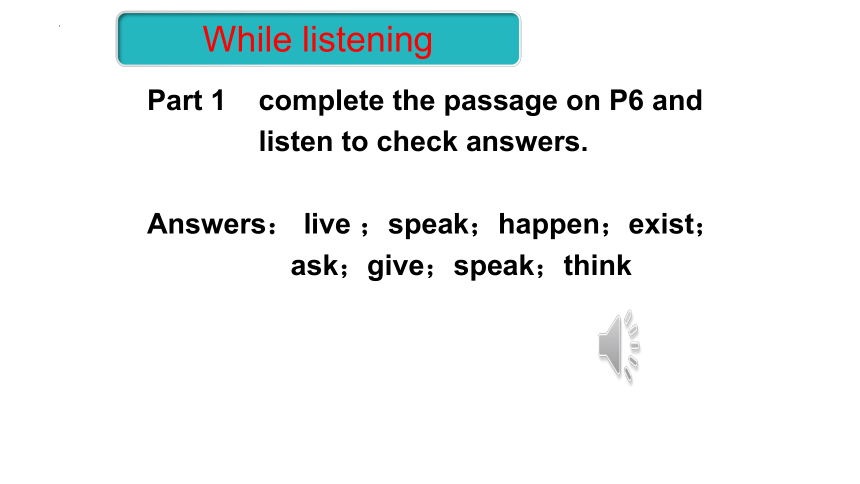

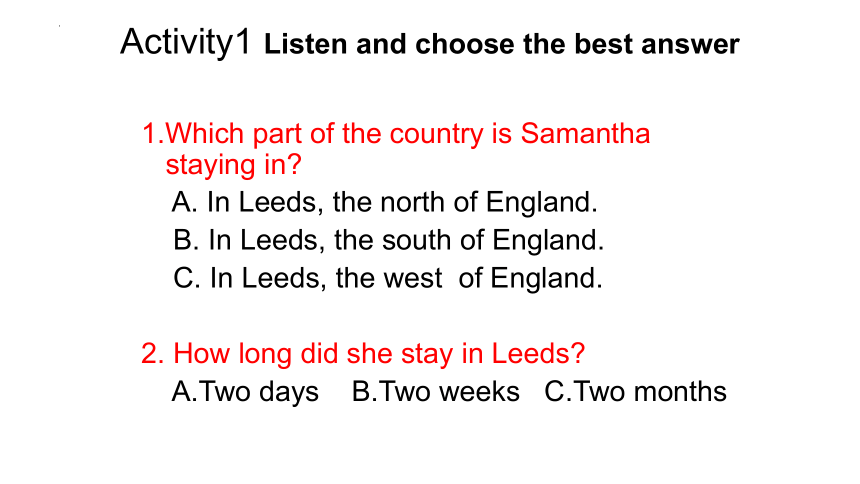
文档简介
(共26张PPT)
Book 5
Module 1
British and American English
Part 5
Page 5~7
Listening & Everyday English
Part 1 What problems will you have if you are abroad as an exchange student
exchange student
交换生
Pre-listening
Below are the problems you may have in America.
①
②
③
④
⑤
火星语
problems
What problems will you have when you are abroad
food
climate
custom
getting on with people
different school subjects and timetable
language
Since there are so many problems you might come across, what do you think is your biggest one
The biggest problem for me should be...,
because...
because of...
owing to...
as...
for...
since...
now that...
Part 1 complete the passage on P6 and
listen to check answers.
Answers: live ;speak;happen;exist;
ask;give;speak;think
While listening
Part 2 Listen for information & answer
questions.
Samantha
Callum
Activity 1
Activity 2
Activity 1
Activity 1
Activity 2
Activity 1
While listening
Activity1 Listen and choose the best answer
1.Which part of the country is Samantha staying in
A. In Leeds, the north of England.
B. In Leeds, the south of England.
C. In Leeds, the west of England.
2. How long did she stay in Leeds
A.Two days B.Two weeks C.Two months
3. What did she notice about the pronunciation of words like dance and bath
A. They’re the same as in American English.
B. They’re not the same as in American English.
C. They’re the same as in Australian English.
4. What is the last question the interviewer asked Samantha
A. Do you think you’ll go home speaking with a
north American accent
B. Do you think you’ll go home with a north of
Australian accent
C. Do you think you’ll go home speaking with a
north of England accent
Check answers
1.Which part of the country is Samantha staying in
A. In Leeds, the north of England.
B. In Leeds, the south of England.
C. In Leeds, the west of England.
2. How long did she stay in Leeds
A.Two days. B.Two weeks. C.Two months.
( A )
( C )
3.What did she notice about the pronunciation of words like dance and bath
A. They’re the same as in American English.
B. They’re not the same as in American English.
C. They’re the same as in Australian English.
4. What is the last question the interviewer asked Samantha
Do you think you’ll go home speaking with a north American accent
Do you think you’ll go home with a north of Australian accident
Do you think you’ll go home speaking with a north of England accent
( A )
( C )
Activity 2 Listen to the interview of Callum and answer questions.
5.How long did Callum spend in the US
A.11 months. B. 10 months. C. 12 months.
6.What didn’t he like about the place he stayed in
A.The climate. B. The food. C. The people.
7.What did he say about the way people spoke
A. It was easy to understand; they spoke rather fast.
B. It was easy to understand; they spoke rather slowly.
C. It was difficult to understand; they spoke rather slowly.
8.What did girls like about Callum
A. His American accent.
B. His English accent.
C. His Australian accent.
Check answers
5. How long did Callum spend in the US
A.11 months. B.10 months. C.12 months.
6.What didn’t he like about the place he stayed in
A.The climate. B.The food. C.The people.
7.What did he say about the way people spoke
A. It was easy to understand; they spoke rather fast.
B. It was easy to understand; they spoke rather slowly.
C. It was difficult to understand; they spoke rather slowly.
8.What did girls like about Callum
A. His American accent.
B. His Australian accent.
C. His English accent.
( B )
( A )
( B )
( C )
Activity 3 Check answers S(Samantha), C(Callum)
who Do
found the local accent difficult to understand.
didn’t find the local accent difficult to understand.
gets on well with other students.
played in a school sports team.
discovered a lively music scene.
enjoyed the end-of-year dance.
thinks everyone will speak American English one day.
thinks it’s only natural that there are lots of varieties of English.
S
C
S
C
S
C
C
S
Tape script: part 2
INT: I’d like to speak to our American guest first. Hi, Samantha, welcome to the show, and welcome to England!
SAM: Thanks!
INT: Where are you from
SAM: I’m from Albany, in New York State.
INT: When did you arrive in the UK
SAM: Two months ago, in September, at the beginning of the school term.
INT: How did you get to hear about the exchange
SAM: I saw an advertisement in my school magazine back in the states.
INT: Where are you attending school (上学)now
SAM: In Leeds, in Yorkshire.
INT: And how are you getting on?
SAM: I’m getting on just fine, now that I understand the local accent.
INT: So it was difficult at first
SAM: Yes, because I didn’t get what people were saying for a couple of days. I think that was the biggest problem I had when I arrived.
INT: But then you got used to it
SAM: Yes-and now it seems quite normal. In fact, in some ways(在一定程度上) the accent here, in the north of England, reminds(提醒) me of American English.
INT: How do you mean
SAM: Well, like they say bath instead of bath, or Do you want to dance instead of dance, like they do in other parts of Britain.
INT: what’s been the most positive thing about the exchange so far
SAM: Definitely the people, especially the other students in my class. They’re really friendly.
INT: Is there anything else you like about living in Britain
SAM: Lots of things, like the music scene in Leeds, for instance. I like Leeds because there’s more going on here than back home in the states. The school has a creative music laboratory, which is really interesting.
INT: I’ve got a question to ask you, Samantha, about the future of English. Do you think in the future everyone will speak American English
SAM: No, why should they Since English is spoken all over the world, I guess it’s only natural that there are lots of varieties.
INT: So do you think you’ll go home speaking with a north of England accent
SAM: Oh no, I didn’t mean that!
Part 3
INT: Well now I’d like to turn to our other guest, another exchange student, that’s eighteen-year-old Callum Nightingale. Callum, you recently returned from the US. How long were you there
Callum: Ten months altogether.
INT: And where were you
Callum: I was in a fertile(肥沃的) agricultural region, in a fairly small town in Mississippi.
INT: That’s quite a long way south, isn’t it
Callum: Yes, it is.
INT: what was the most difficult problem you had
Callum: I reckon(认为) it was climate; it was hot and humid for a lot of the time.
INT: How did you get on with American English
Callum: Well, I didn’t really have any problem with the accent. It was easy to understand, they speak rather slowly..
INT: But did they understand you
Callum: That’s a good point. I think they did. As I was the only British person in the school they made a fuss of me. The girls all said my accent was cute.
INT: what was the best moment of your stay
Callum: I think it was the prom( 正式舞会 ), that’s the school dance at the end of the year.
INT: I want to ask you a couple of questions about American English. Did you find that a lot of words are different
Callum: yes, especially at school-they have grades, we have years, and then the names of subjects are a bit different, like “civics”, which basically means law and government. And some sports are different-football means American football, not soccer-I actually played in the soccer team. Then the American word for maths is math, without the “s” – that seems like a very small detail. But the first time I heard it, it sounded strange…but you get used to it. When I came home my mum said I had picked up an American accent, but it’s worn off now I think.
INT: Callum, do you think that in the future everybody will speak an American variety of English
Callum: Maybe yes. I think the British will speak American English because they hear it every day now, on TV, in films and so on.
INT: And are you happy about that
Callum: I don’t know. I suppose(认为) I don’t mind, really. Everything changes sooner or later.
Everyday English: Complete the sentences with the correct
phrases.
1. How are you getting on is a question about ______.
A. Samantha’s health
B. what Samantha is doing
2. I didn’t get what people were saying means _______.
A. I didn’t understand it B. I didn’t like it
How are you getting on / along with sb. / sth.
常用来询问与人相处的情况或某事的进展情况。
get = understand
3. When Samantha got used to the accent she____.
A. began to understand it
B. used it when she spoke English
4. So far means _____.
A. for a long time B. until now
get / become / be used to (doing) sth.
习惯于(做)某事 (to为介词;get / become为非延 续性动词)
so far = until now / by now /up to now/up till now,常与现在完成时连用。
5. That’s a good point means____.
A. what you say is interesting
B. I agree with you
6. The girls in Callum’s school made a fuss of him
by______.
A. laughing at him
B. showing a lot of interest in him
That’s a good point. 译为:说得好!有道理!这个看法不错!真有意思!
make a fuss of /over sb. / sth.
对......关爱备至;过分关心或体贴......;宠爱;呵护
7. A cute accent is ____.
A. horrible B. attractive
8. A couple of means ____.
A. two B. two or three
9. If Callum picked up the local accent he ____.
A. started to use it B. wasn’t able to use it
10. If Callum’s American accent has worn off, it has___.
A. disappeared B. become very noticeable
cute adj. 逗人喜爱的;漂亮的;精明的;聪明的
a couple of:一对; 两个; 一些;几个
a couple:一对夫妇;一对情侣
pick up: learn sth. by watching or listening无意中学会
wear off: 疼痛或某种效果逐渐减少或消失
Book 5
Module 1
British and American English
Part 5
Page 5~7
Listening & Everyday English
Part 1 What problems will you have if you are abroad as an exchange student
exchange student
交换生
Pre-listening
Below are the problems you may have in America.
①
②
③
④
⑤
火星语
problems
What problems will you have when you are abroad
food
climate
custom
getting on with people
different school subjects and timetable
language
Since there are so many problems you might come across, what do you think is your biggest one
The biggest problem for me should be...,
because...
because of...
owing to...
as...
for...
since...
now that...
Part 1 complete the passage on P6 and
listen to check answers.
Answers: live ;speak;happen;exist;
ask;give;speak;think
While listening
Part 2 Listen for information & answer
questions.
Samantha
Callum
Activity 1
Activity 2
Activity 1
Activity 1
Activity 2
Activity 1
While listening
Activity1 Listen and choose the best answer
1.Which part of the country is Samantha staying in
A. In Leeds, the north of England.
B. In Leeds, the south of England.
C. In Leeds, the west of England.
2. How long did she stay in Leeds
A.Two days B.Two weeks C.Two months
3. What did she notice about the pronunciation of words like dance and bath
A. They’re the same as in American English.
B. They’re not the same as in American English.
C. They’re the same as in Australian English.
4. What is the last question the interviewer asked Samantha
A. Do you think you’ll go home speaking with a
north American accent
B. Do you think you’ll go home with a north of
Australian accent
C. Do you think you’ll go home speaking with a
north of England accent
Check answers
1.Which part of the country is Samantha staying in
A. In Leeds, the north of England.
B. In Leeds, the south of England.
C. In Leeds, the west of England.
2. How long did she stay in Leeds
A.Two days. B.Two weeks. C.Two months.
( A )
( C )
3.What did she notice about the pronunciation of words like dance and bath
A. They’re the same as in American English.
B. They’re not the same as in American English.
C. They’re the same as in Australian English.
4. What is the last question the interviewer asked Samantha
Do you think you’ll go home speaking with a north American accent
Do you think you’ll go home with a north of Australian accident
Do you think you’ll go home speaking with a north of England accent
( A )
( C )
Activity 2 Listen to the interview of Callum and answer questions.
5.How long did Callum spend in the US
A.11 months. B. 10 months. C. 12 months.
6.What didn’t he like about the place he stayed in
A.The climate. B. The food. C. The people.
7.What did he say about the way people spoke
A. It was easy to understand; they spoke rather fast.
B. It was easy to understand; they spoke rather slowly.
C. It was difficult to understand; they spoke rather slowly.
8.What did girls like about Callum
A. His American accent.
B. His English accent.
C. His Australian accent.
Check answers
5. How long did Callum spend in the US
A.11 months. B.10 months. C.12 months.
6.What didn’t he like about the place he stayed in
A.The climate. B.The food. C.The people.
7.What did he say about the way people spoke
A. It was easy to understand; they spoke rather fast.
B. It was easy to understand; they spoke rather slowly.
C. It was difficult to understand; they spoke rather slowly.
8.What did girls like about Callum
A. His American accent.
B. His Australian accent.
C. His English accent.
( B )
( A )
( B )
( C )
Activity 3 Check answers S(Samantha), C(Callum)
who Do
found the local accent difficult to understand.
didn’t find the local accent difficult to understand.
gets on well with other students.
played in a school sports team.
discovered a lively music scene.
enjoyed the end-of-year dance.
thinks everyone will speak American English one day.
thinks it’s only natural that there are lots of varieties of English.
S
C
S
C
S
C
C
S
Tape script: part 2
INT: I’d like to speak to our American guest first. Hi, Samantha, welcome to the show, and welcome to England!
SAM: Thanks!
INT: Where are you from
SAM: I’m from Albany, in New York State.
INT: When did you arrive in the UK
SAM: Two months ago, in September, at the beginning of the school term.
INT: How did you get to hear about the exchange
SAM: I saw an advertisement in my school magazine back in the states.
INT: Where are you attending school (上学)now
SAM: In Leeds, in Yorkshire.
INT: And how are you getting on?
SAM: I’m getting on just fine, now that I understand the local accent.
INT: So it was difficult at first
SAM: Yes, because I didn’t get what people were saying for a couple of days. I think that was the biggest problem I had when I arrived.
INT: But then you got used to it
SAM: Yes-and now it seems quite normal. In fact, in some ways(在一定程度上) the accent here, in the north of England, reminds(提醒) me of American English.
INT: How do you mean
SAM: Well, like they say bath instead of bath, or Do you want to dance instead of dance, like they do in other parts of Britain.
INT: what’s been the most positive thing about the exchange so far
SAM: Definitely the people, especially the other students in my class. They’re really friendly.
INT: Is there anything else you like about living in Britain
SAM: Lots of things, like the music scene in Leeds, for instance. I like Leeds because there’s more going on here than back home in the states. The school has a creative music laboratory, which is really interesting.
INT: I’ve got a question to ask you, Samantha, about the future of English. Do you think in the future everyone will speak American English
SAM: No, why should they Since English is spoken all over the world, I guess it’s only natural that there are lots of varieties.
INT: So do you think you’ll go home speaking with a north of England accent
SAM: Oh no, I didn’t mean that!
Part 3
INT: Well now I’d like to turn to our other guest, another exchange student, that’s eighteen-year-old Callum Nightingale. Callum, you recently returned from the US. How long were you there
Callum: Ten months altogether.
INT: And where were you
Callum: I was in a fertile(肥沃的) agricultural region, in a fairly small town in Mississippi.
INT: That’s quite a long way south, isn’t it
Callum: Yes, it is.
INT: what was the most difficult problem you had
Callum: I reckon(认为) it was climate; it was hot and humid for a lot of the time.
INT: How did you get on with American English
Callum: Well, I didn’t really have any problem with the accent. It was easy to understand, they speak rather slowly..
INT: But did they understand you
Callum: That’s a good point. I think they did. As I was the only British person in the school they made a fuss of me. The girls all said my accent was cute.
INT: what was the best moment of your stay
Callum: I think it was the prom( 正式舞会 ), that’s the school dance at the end of the year.
INT: I want to ask you a couple of questions about American English. Did you find that a lot of words are different
Callum: yes, especially at school-they have grades, we have years, and then the names of subjects are a bit different, like “civics”, which basically means law and government. And some sports are different-football means American football, not soccer-I actually played in the soccer team. Then the American word for maths is math, without the “s” – that seems like a very small detail. But the first time I heard it, it sounded strange…but you get used to it. When I came home my mum said I had picked up an American accent, but it’s worn off now I think.
INT: Callum, do you think that in the future everybody will speak an American variety of English
Callum: Maybe yes. I think the British will speak American English because they hear it every day now, on TV, in films and so on.
INT: And are you happy about that
Callum: I don’t know. I suppose(认为) I don’t mind, really. Everything changes sooner or later.
Everyday English: Complete the sentences with the correct
phrases.
1. How are you getting on is a question about ______.
A. Samantha’s health
B. what Samantha is doing
2. I didn’t get what people were saying means _______.
A. I didn’t understand it B. I didn’t like it
How are you getting on / along with sb. / sth.
常用来询问与人相处的情况或某事的进展情况。
get = understand
3. When Samantha got used to the accent she____.
A. began to understand it
B. used it when she spoke English
4. So far means _____.
A. for a long time B. until now
get / become / be used to (doing) sth.
习惯于(做)某事 (to为介词;get / become为非延 续性动词)
so far = until now / by now /up to now/up till now,常与现在完成时连用。
5. That’s a good point means____.
A. what you say is interesting
B. I agree with you
6. The girls in Callum’s school made a fuss of him
by______.
A. laughing at him
B. showing a lot of interest in him
That’s a good point. 译为:说得好!有道理!这个看法不错!真有意思!
make a fuss of /over sb. / sth.
对......关爱备至;过分关心或体贴......;宠爱;呵护
7. A cute accent is ____.
A. horrible B. attractive
8. A couple of means ____.
A. two B. two or three
9. If Callum picked up the local accent he ____.
A. started to use it B. wasn’t able to use it
10. If Callum’s American accent has worn off, it has___.
A. disappeared B. become very noticeable
cute adj. 逗人喜爱的;漂亮的;精明的;聪明的
a couple of:一对; 两个; 一些;几个
a couple:一对夫妇;一对情侣
pick up: learn sth. by watching or listening无意中学会
wear off: 疼痛或某种效果逐渐减少或消失
